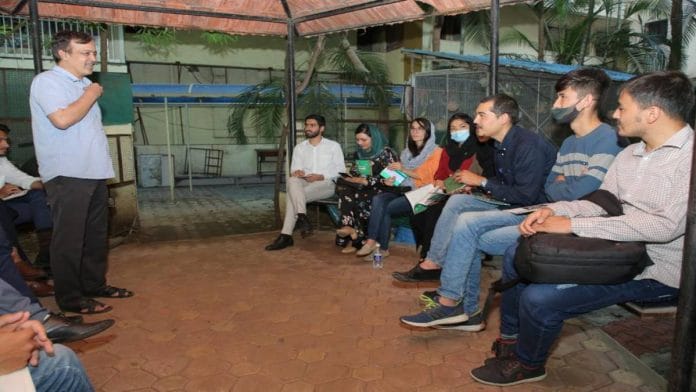Mumbai: Ever since Afghanistan’s capital Kabul fell to the Taliban two weeks ago, a WhatsApp number in Pune — 8007066900 — has been buzzing at least once every hour.
About 400 Afghans, mostly students in Pune, have called or texted for help, fearing for their families back home, their own safety and ability to continue education, and sought help with visa extensions, or financial support.
At the other end, is a small team of 10 attached to Sarhad, a Pune-based non-government organisation that has been running a helpline for Afghan nationals for a variety of needs — or just to be a sounding board for those who need someone to talk to about their worries after the Taliban’s takeover of their country.
The insurgent group overran Afghanistan on 15 August and is now firmly in control after the US’s complete withdrawal on 31 August.
“There are some students whose scholarship is over, whose visas are expiring, but they don’t want to go back to Afghanistan in this situation. Then there are some who have major financial problems because they are not able to get money from back home. They are unable to pay their fees or even food and accommodation here,” Sanjay Nahar, 55, founder of Sarhad, told ThePrint.
Many Afghan students who are enrolled in colleges in the city but were taking online classes from Afghanistan during the pandemic want to return to India to ensure that there is no break in their education, said Nahar.
“There are also some who have got admission here and have submitted their passports for a visa, but have no idea on how they will be able to leave the country now,” he added.
Sarhad helps the callers with the necessary policy information, liaises with relevant people at the educational institutions and government officials in case of visa-related issues. The NGO has also received email requests — 10 to 12 so far — for help.
Also read: Amin al-Haq, who helped Osama bin Laden escape US capture once, returns to Taliban
Counselling and financial help
Two 20-year-olds — Zahid Bhatt, a Kashmiri, and Rahul Mengade, a local from Pune — are the first points of contact for the callers, often their peers in age. Bhatt and Mengade first screen calls into different categories. They also lend an ear to those just looking for words of courage and hope. Matters related to visas, passports, fees, and scholarships are escalated to Nahar, who delegates the problems to other Sarhad members and tries to resolve them with urgency.
“Just two hours ago, we got a call from someone who was scared of police action as he didn’t have a passport. I put that person in touch with a senior activist in Delhi who explained to him the procedure of how to apply for refugee status,” Nahar told ThePrint.
Through the two weeks that the helpline has been active, the NGO has noticed that a number of callers are more comfortable in expressing themselves in Dari — the lingua franca of Afghanistan — and Pashto. So, by the end of this week, Sarhad plans to enlist two more volunteers, both Afghans, to man the WhatsApp helpline and be the first point of contact.
Sarhad has identified about 200 of the callers who are in dire financial need and has given them a token aid of Rs 3,000 to tide over the immediate crisis. The NGO has so far disbursed this amount to about 100 Afghan students in Pune. It is also coordinating the efforts of ten Pune-based institutions who are collaborating to sponsor food, housing, and fees of Afghan students enrolled in the city’s educational institutions, Nahar said.
Afghan students in Pune
According to the All India Survey on Higher Education 2019-20 data, India registered 4,504 student admissions from Afghanistan — Afghans account for about 9.1 per cent of all foreign students in India.
Sarhad data shows that there are about 1,500 Afghan students in Pune, one of the largest Afghan diaspora groups in India. They are enrolled across various courses from diplomas to PH.Ds in colleges such as Savitribai Phule Pune University, institutes under the Symbiosis Group, Azam Campus, Maharashtra Institute of Technology, and Vishwakarma Institute of Technology.
In the last two weeks, delegations of Afghan students in Pune have met State Higher Education Minister Uday Samant and Cabinet Minister Aaditya Thackeray, Chief Minister Uddhav Thackeray’s son, about visa issues and financial distress.
(Edited by Paramita Ghosh)
Also read: India is adjusting to the new ground reality in Kabul, coming to terms with Naya Afghanistan






